In this edition of court judgements review, we look at the Supreme Court’s judgement on dismissal of CISF officer, Kerala High Court’s remarks on ‘Right to be Forgotten’, Delhi High Court’s judgement on molestation, Madras High Court’s judgement on court’s interference in PMLA proceedings, and Jammu & Kashmir and Ladakh High Court’s judgement on maintainability of writ petition in light of availability of an alternative and effective remedy.
SC: Police Officers are not required to do moral policing, ask for physical favour or material goods
In CISF and Others vs. Santosh Kumar Pandey, the apex court held that even police officers are not required to do any form of moral policing, while upholding the dismissal of a Central Industrial Security Force (CISF) officer who harassed a couple at night.
The bench of Justice Sanjiv Khanna and Justice J.K. Maheshwari was hearing an appeal filed by the CISF against the reinstatement of the officer as directed by the Gujarat High Court. Santosh Kumar Pandey was on night duty when he saw his colleague with his fiancée travelling in a motorbike. He then stopped them and asked his colleague if ‘he can spend some time’ with his fiancée and also demanded some material goods if they were to be left. Upon a complaint and subsequent departmental inquiry, it was found that the officer was guilty and as a result, was dismissed from the service. It was challenged by the officer in Gujarat High Court which directed reinstatement along with the 50% back wages. The CISF filed an appeal against this judgement.
Upon hearing the counsels from both sides and looking at the evidence and reasoning, the apex court held that unless the court finds that the findings recorded are based on no evidence, are perverse, or are legally untenable in the sense that it fails to pass the muster of the Wednesbury principles, judicial review is not equivalent to adjudication of the case on the merits, and adequacy or inadequacy of evidence. In this case particularly, it observed that when the Evidence Act is not relevant, a comprehensive and practical approach is necessary. Even when the Evidence Act is applicable, the enactment grants discretion on issues related to the evaluation, analysis, and appraisal of evidence. It further held that

Regarding the issue of penalty proportionality, the apex court held that the facts in the current instance are shocking and upsetting. The respondent is not a police officer, and even police officers are not required to do moral policing or solicit pecuniary or physical favours.
Accordingly, the disciplinary authority’s decision to remove the employee from service is upheld, and High Court’s judgement is set aside.
Kerala HC: A claim for the protection of personal information based on the right to privacy cannot co-exist in an Open Court justice system and in cases where the law does not recognize the open court system and matrimonial cases, masking of personal identities is permitted
In Vysakh K.G. vs. Union of India & Anr. And Other Connected Cases, the Kerala High Court held that a claim for the protection of personal information based on the right to privacy cannot coexist in an open court justice system, and masking of personal identities is allowed in situations where the law does not recognise the open court system.
The Division Bench comprising of Justice A. Muhamed Mustaque and Justice Shoba Annamma Eapen was hearing a petition referred by Single Judge Justice Anil K. Narendran as these cases present a question of seminal importance in judicial information policy. The reference is as below.
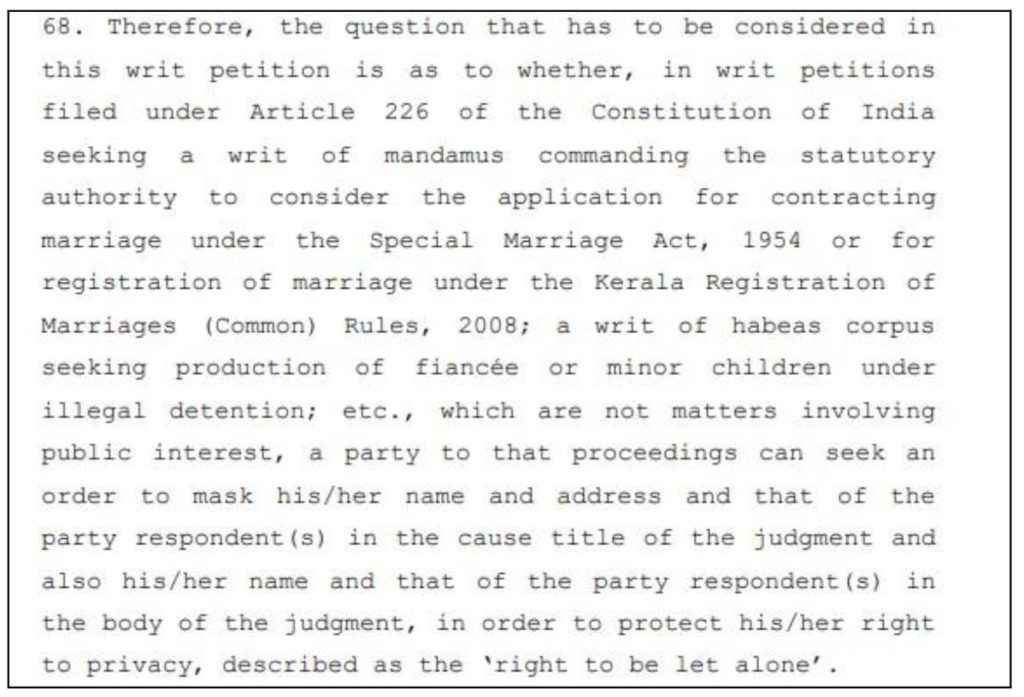
This was clubbed with other cases that have similar arguments. The petitioners claim in these cases is regarding the publication of court records and the right to privacy and the fine balance between them. The discussion in the High Court proceedings was around Privacy, Courts as democratic institutions, open data and public interest and the right to be forgotten.
On the Privacy front, the Court felt that the primary issue for the petitioners is allowing their personal and private information to remain permanently in the digital public space, invading their right to privacy and right to forget the past. On the Courts as institutions, it is held that a greater emphasis must be laid on the public interest to strengthen the relationship between open justice and the populace and to foster confidence in the administration of justice. Every public institution in a liberal democracy is based on public deliberation. On the issue of open data, the court viewed that the information that is available to the judiciary cannot be monopolised by the Court. Data withholding would be detrimental to””””””””””””””””””””””””””””””””””””””””””””””””””””””””””””””””””””””””””””””””””””””””””””””””””””””””””””””” the general welfare. The judiciary is required by the wider public interest to share data with the general public, stakeholders, researchers, government, etc., even though courts have not established any open data policies. While deciding on a case of this nature, the Court cannot disregard the greater legal environment in which the administration of justice operates. On the issue of the ‘Right to be forgotten’, the “right to be forgotten” cannot be asserted as a “right in presentium” because it is contextually tied to the past. Everybody has the right to live in the present and forget about the past. This is a fundamental aspect of the right to live honourably.
Upon hearing the counsels, Amicus Curie, and senior lawyers, the Kerala High Court held that,
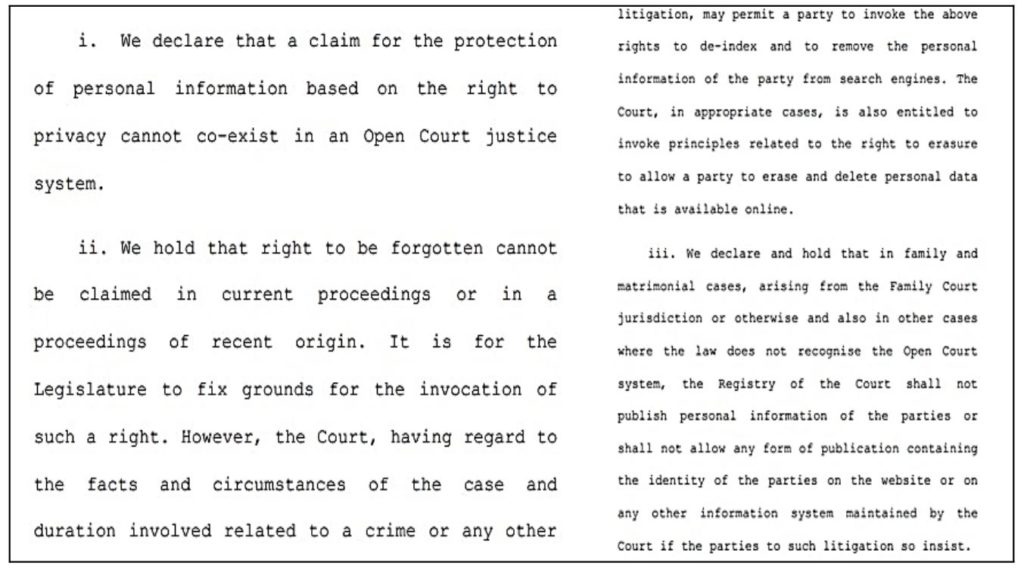
The court further stressed on the need for a legislation on this right to be forgotten. It held that nothing stops the Legislature from passing legislation recognising the right to be forgotten, which would allow it to decide what time period should be used to remove such information once it has passed. The Legislature also has the authority to specify the conditions under which a right to be forgotten may be exercised. The legislation must specify the grounds on which a person may assert the right to be forgotten because it is not an absolute right.
Finally, the High Court held that the Registry is bound to publish privacy notices on its website in both English and vernacular languages. Accordingly, the reliefs are granted.
Delhi HC: Priority should be given to the wellbeing of the child whose mental psyche is vulnerable, impressionable, and susceptible while dealing with issues connected to harassment of school-aged children
The Delhi High Court, in Ranajit Roy vs. Govt of NCT of Delhi & Anr, observed that any act of sexual harassment can cause mental trauma and can influence their thought process in the years that follow and in a majority of times, the long-term effects of sexual harassment are insurmountable.
The division bench of Chief Justice Satish Chandra Sharma and Justice Subramonium Prasad was hearing an appeal against the judgement of a single judge that upheld the orders of the Delhi School Tribunal and Disciplinary Authority imposing the penalty of compulsory retirement on the appellant. The appellant is a physics teacher against whom charges of sexual molestation are filed by the student of the ninth standard, which led to the suspension on grounds of lack of integrity and in violation of Rule 123(b)(xvii) and (xviii) of the Delhi School Education Rules, 1973. The Disciplinary authority handed down a heavy sanction of removal from service and the Appellant was given 15 days to file any representation against the proposed penalty. The Appellant appealed against the aforementioned order to the Tribunal which rejected the appellant’s appeal, and the appellant then challenged the Tribunal’s decision by submitting a Writ Petition to the learned Single Judge. The Order of the Tribunal and the Order of the Disciplinary Authority imposing the punishment of compulsory retirement on the appellant were upheld by the learned Single Judge.
The Division bench, upon hearing both sides held that nothing substantial was brought on record by the appellant which would call for the interference of the court. It relied on the judgement of the apex court in Union of India and others vs. P. Gunasekaran , which listed out principles that mandate the court’s interference in disciplinary proceedings.
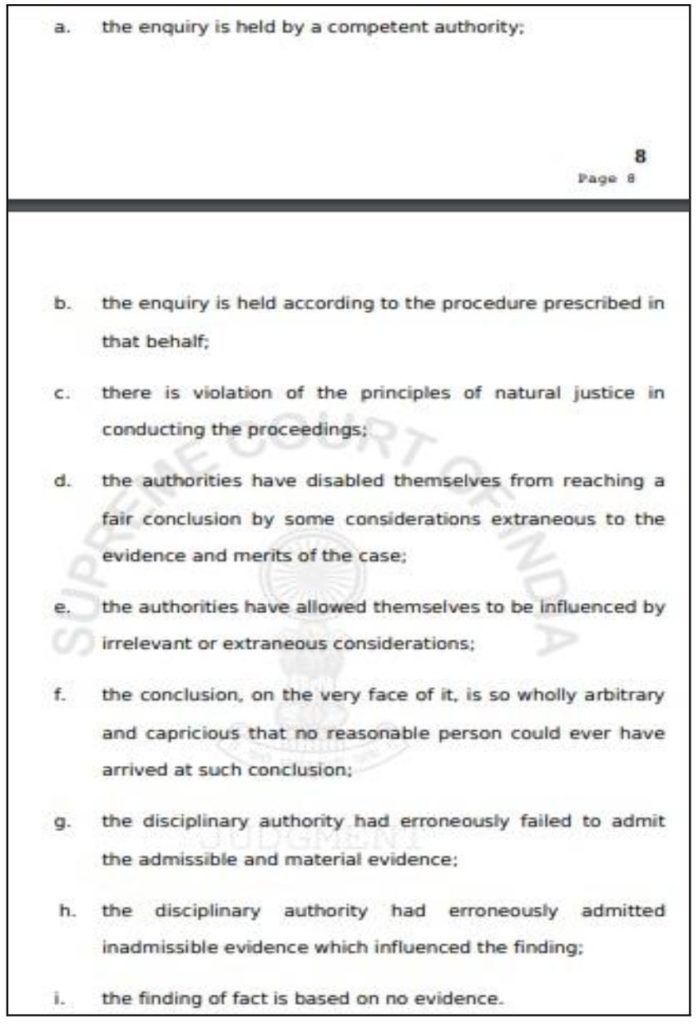
Further, it relied on Union of India and Others vs. Subrata Nath, it was held that Courts ought to refrain from interfering with findings of facts recorded in a departmental inquiry except in circumstances where such findings are patently perverse or grossly incompatible with the evidence on record, based on no evidence.
Accordingly, it held that keeping in mind the judgement rendered in the case of P. Gunasekaran, none of the broad parameters, within which the High Court ought to exercise its powers under Articles 226 & 227 of the Constitution of India, and therefore, it does not see any reason to interfere with the Orders issued by the Disciplinary Authority, the Tribunal, and the learned Single Judge. The appeal was dismissed accordingly.
Madras HC: Courts are not expected to stall investigations unless such an investigation is found to be without jurisdiction or there is misuse of power of investigation, or such an investigation is an abuse of process of law
The Madras High Court, in Southern Agrifurane Industries Private Ltd., vs. The Assistant Director, Directorate of Enforcement, held that the courts cannot act as stumbling blocks in the investigation if they are satisfied that the investigation is within the contours of the law and there is no misuse of the power of investigation.
The two-judge bench comprising of Justice P.N. Prakash and Justice N. Anand Venkatesh, was hearing a plea by Southern Agrifurane Industries Private Ltd to refrain the ED from proceeding with an Enforcement Case Information Report (ECIR) on the grounds that the Directorate was acting outside of its authority under the Prevention of Money Laundering Act.
The corporation was accused of sending foreign currency abroad in contravention of the Foreign Exchange Management Rules, and the ED launched an inquiry. Certain movable and immovable possessions of the petitioner were seized subject to interim orders by the Directorate, which was not approved by the Competent authority. Further, it was argued that the company’s behaviour merely constitutes a FEMA violation and that no case of cheating had been established. Furthermore, even if the accusations were true, there were no proceeds of crime, and without those, no violation of the PMLA was established.
The court heard the counsels of both sides and agreed with the submissions made by the ED. It relied on judgement of the apex court in Vijay Madanlal Choudhary and Others. vs. Union of India and Others, where it was held that the ECIR is a departmental document that is exclusively used to open an inquiry under the PML Act and cannot be compared to a FIR. A predicate offence that complies with the scheduled offence requirements of the PML Act must have occurred to launch such an investigation. Apart from that, it suffices if there is prima facie evidence that the scheduled offence has produced proceeds of crime. In the current instance, both prerequisites are met.
Further, the High Court held that,
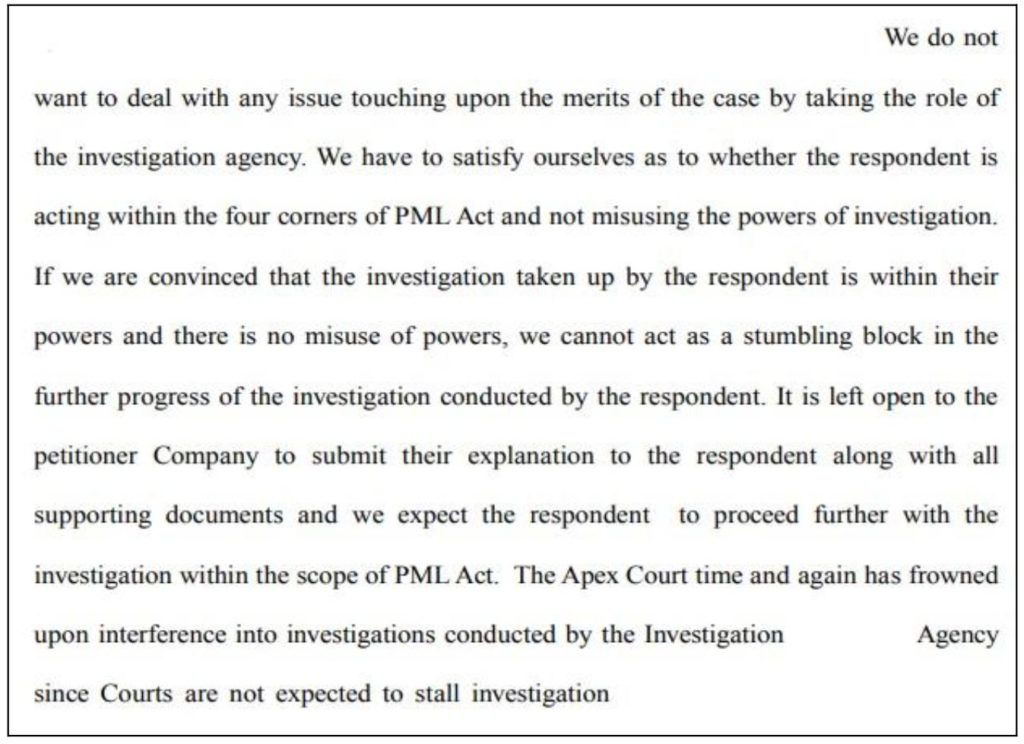
Accordingly, the writ petition was dismissed.
JKL High Court: In face of availability of statutory and equally efficacious remedy, writ petition should not be entertained
In Bindu Singh Jamwal vs. UT of J&K & Ors., the Jammu and Kashmir and Ladakh High Court held that unless there are exceptions carved out to the general principles, writ petition cannot be entertained in the face of availability of an alternative and efficacious remedy.
A single judge bench of Wasim Sadiq Nargal was hearing a writ petition against the unilateral alteration of a revenue entry in respect of a piece of land without hearing the petitioner, the Sub-Divisional Magistrate’s decision to remove an interim ruling in favour of the petitioner was being challenged in court. Further, the SDM ordered that a report must be submitted by the Tehsildar within 15 days, and the private respondent, in whose name the revenue entry was made, was prohibited from interfering with the petitioner’s possession. The court proceeded on the merits and vacated the interim order since the petitioner was unable to show up on the next date.
The counsel for the petitioner claims that the challenged ruling is otherwise perverse and cannot pass the test of law, and as such should be overturned. Because the petitioner had to be heard before the interim order could be vacated, the petitioner’s counsel has filed for its annulment. The counsel for the respondent has raised preliminary concerns in light of an alternative and effective remedy afforded by the Land Revenue Act, with regard to the maintainability of the writ petition.
Hearing both sides, the High Court agreed with the submission by the respondent that the current writ petition is not maintainable and is liable to be dismissed, as the petitioner did not avail of the alternative and effective remedy made available by the Act. Further, the court held that it did not think this is a situation that falls under the exceptions to the general principles, where the Constitutional Court would accept the present writ petition under Article 226 of the Indian Constitution in the face of an alternative and effective remedy.
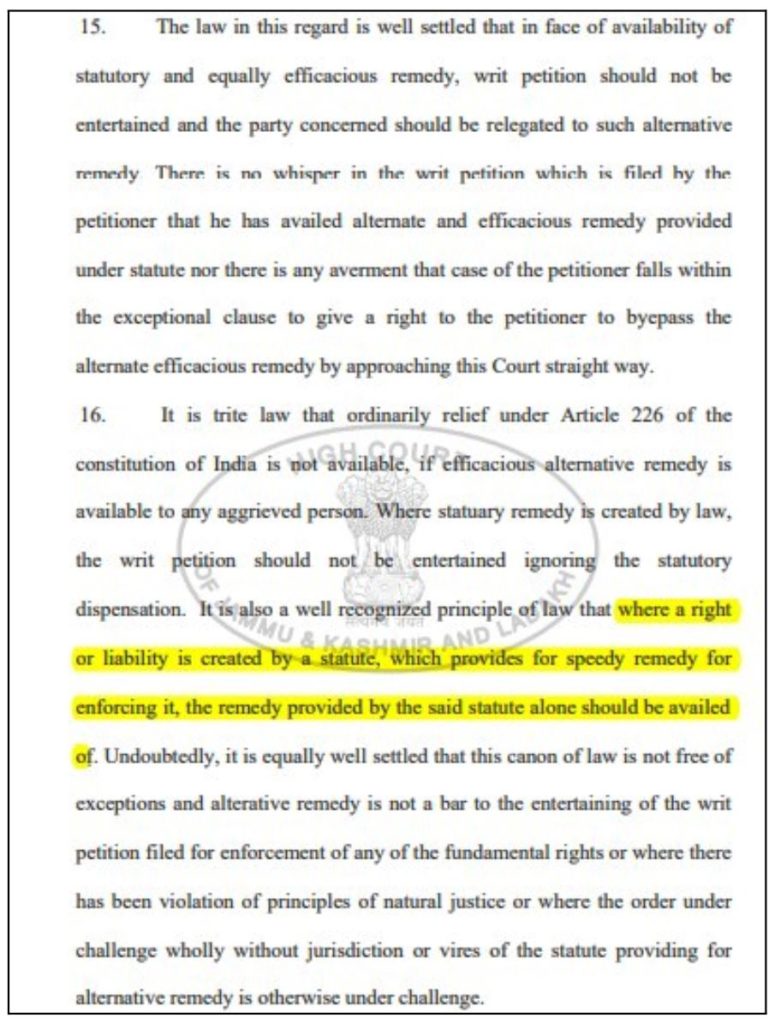
The High Court held that the petitioner failed to demonstrate how the petition falls under the exceptions carved to the general principles of law in cases of availability of alternate remedy.


